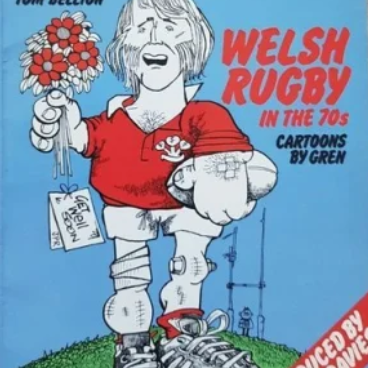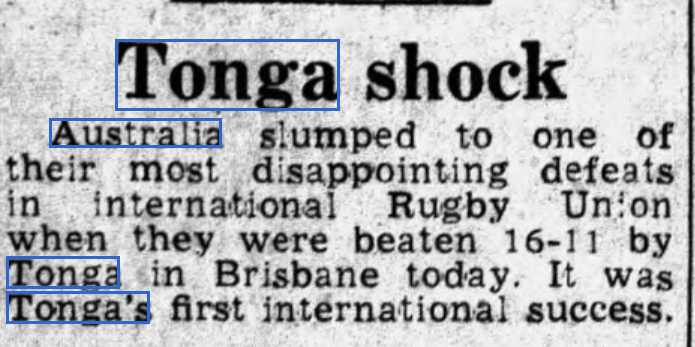
The Tongan Rugby tour of Australia in 1973 saw the rugby shock of the century as Tonga famously beat Australia, 16-11. The Tongans were expected to provide ‘entertainment without football finessee’ but managed a thrilling victory in match that the Tongans always looked superior.
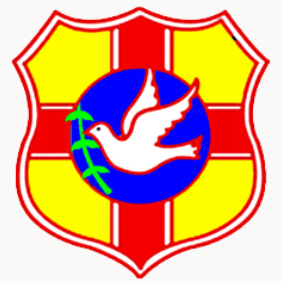
Rugby was relatively new to Tonga, brought to the region in the early 20th century by sailors and missionaries and formed in late 1923. The team is nicknamed ʻIkale Tahi (Sea Eagles). Test matches for them were rare as they did not tour. Tonga beat New Zealand Moaries in 1969, but had to wait until 1973 before they played their second test match, a 30–12 defeat against Australia in Sydney in the 1st Test. However, revenge was sweet as they beat Australia 16-11 a week later at Ballymore Stadium, Brisbane scoring four tries to two in the second test.
The tour was a great experience socially as well as it was only the second tour undertaken by the Tongan national team, the first in which a full international was scheduled and a forerunner to a tour of Wales in 1974.
All focus has been on their famous victory but it was a tour of mixed results! It reads 2 wins and 5 losses! This is a brief history of that famous tour in 1973.
11th June 1973. Tonga 19 Sydney 14 at North Sydney Oval
The warning signs were there for Australia as Tonga opened their tour with a 19-14 defeat of a star-studded Sydney side. Here winger Isikeli Vave, a 25-year-old Army private, having his first season in representative rugby, scored a try. Vave went on to win 4 caps including one at Murrayfield against Sccotland in 1974 and gave established Wallaby wing rival John Cole a humiliating 80 minutes!
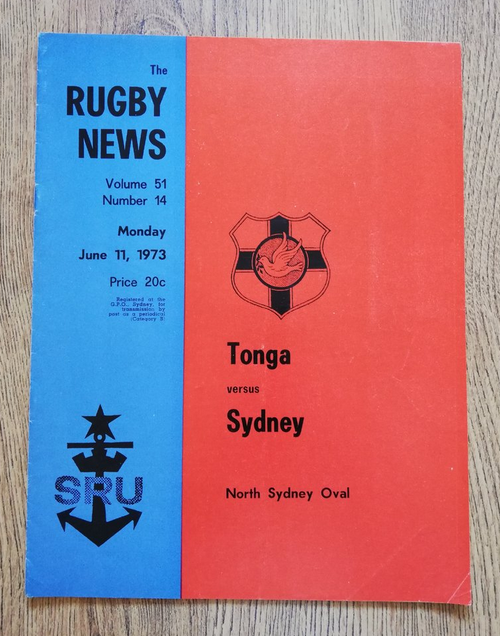
Image from https://rugbyreplay.co.uk/
An elated Tongan manager, Lupeti Finau, said after the game that he had not been very confident of a win but was hoping to entertain the crowd so they would ask Tonga to tour again!
All we wanted to do was please the people. If we can entertain them, we are assured of more tours.
16th Jun 1973. Tonga NSW (New South Wales) at Sydney Sports Ground (no record of score)
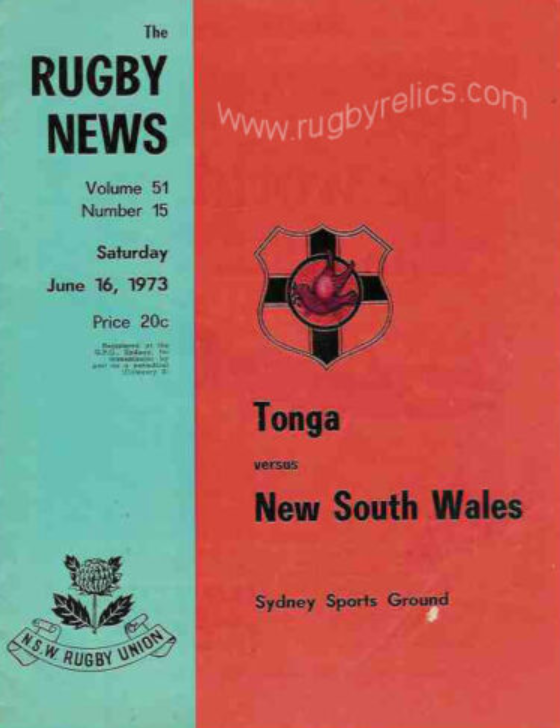
The Tongans failed to capitalise on their Sydney win and lost to New South Wales on 16th June. Their manager, Mr Lupeti Finau, said the loss had not upset his team unduly. The team had not clicked as it had against Sydney and the players were puzzled by some of the rulings of the referee.
Although the Tongans had received visits from prominent New Zealanders in recent years and had toured New Zealand, it was difficult for them to adapt their natural style of open running play to the forward disciplines which were necessary. This haunted them against New South Wales.
19th Jun 1973. Tonga 6 ACT (Australian Capital Territory) 17
Next stop was a flight to Canberra to play ACT (Australian Capital Territory).
TheTongans were most welcome visitors Australia. The hospitality, as shown in Canberra, to the Tonguns on the tour was overwhelming resulting in a very busy schedule for them. However, their only engagement on the Sunday before the game was a service at the National Methodist Church.
After training on Monday morning the team attended a welcome givcn by the ACTRU, with the assistance of the Tongan community of Canberra and Queanbcyan, at the home of Maile Latukefu. Profits went to the Tongan tour fund. In the afternoon the party visited the Australian War Memorial and Parliament House where they were guests of the Minister for Tourism and Recreation.
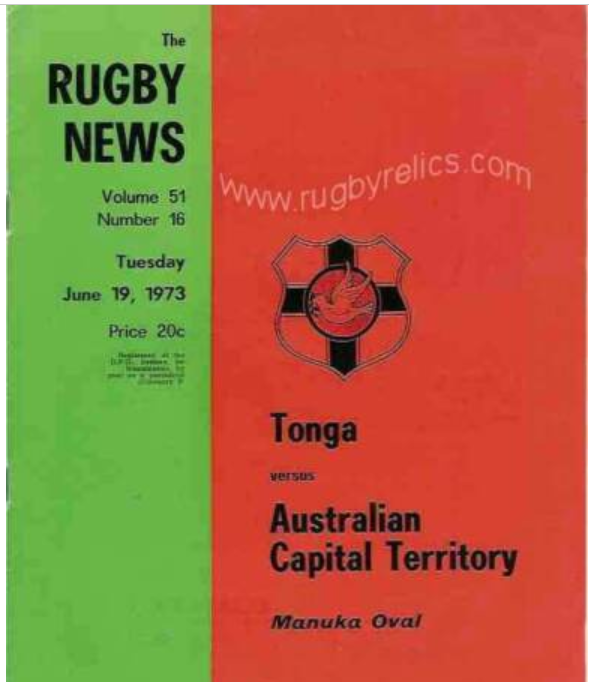
Regrettably, matters on the field were not going Tonga’s way as they lost 17-6 to ACT at the Manuka Oval. ACT scored tries through John Weatherstone (two), a future Wallaby, and Chris Lord. There was a field goal by Weatherstone and a conversion by Mick Cuthel to two penalty goals by the Tongan captain, Sionc Mafi, in a match which failed to show the expected Tongan panache. ACT had a former Tongan International, Supi Hotu, in their ranks who had 5 caps and played in Tonga’s victory against the Maories in 1969.
Programme image from http://www.rugbyrelics.com/
Again the game highlighted Tonga’s great need to master forward disciplines if it was to progress in international rugby. There was celebration for ACT as this was their first win over a touring international side.
June 23rd, 1973. 1st Test, Australia 30 Tonga 12, Sydney Cricket Ground
The first test was played at Sydney Cricket Ground. Australia were under pressure as had not recovered from their recent poor New Zealand tour, resulting in their coach Bob Templeton coming close to quitting.
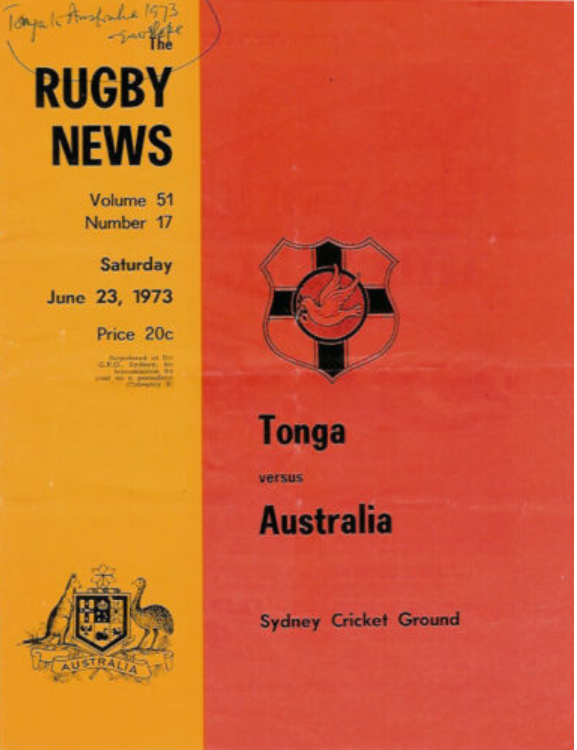
A Former All Black, Owen Stephens, featured for Australia and scored two tries. Stephens was also known as Noddy and has the distinction of being one of only three players to have played international rugby union for both New Zealand and Australia.
There were also first caps for No.8 Mark Loane who went on to win 28 caps from 1973 to 1982 and Trevor Stegman who only played for the Wallabies for the Tonga tests.
Australia played against a scrappy Tongan defence and scored two tries to go into a 27-6 lead. Vave, who had an unhappy match, presented Australia’s half John Hipwell with a try soon after the restart when the Tongans could not grasp his pass.
Tonga’s second try came near the finish when full back Valita Ma’ake crossed in the corner. Australia’s big second rower Garrick Fay booted a left-footed field goal almost a minute after the full-time hooter had sounded. It was Fay’s first dropped goal in first class rugby and probably his only attempt!
Coach Bob Templeton said he was ‘delighted’ with the Australian team’s display as ‘they coped particularly well with the unorthodox Tongan tactics’
New South Wales County 22 Tonga 11
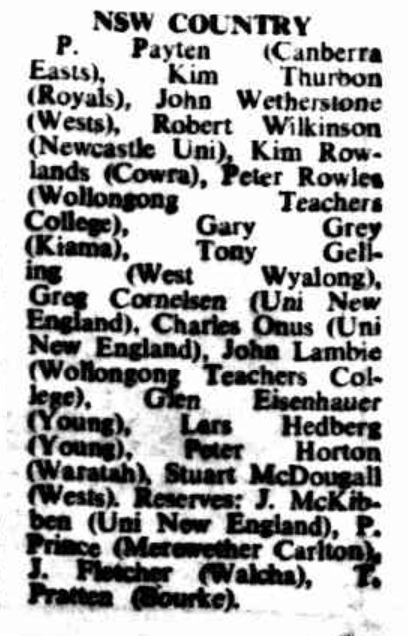
This was Tonga’s fourth defeat in succession on their Australian tour. NSW tries were scored by Greg Cornelson of New England University and John Wetherstone of Wests. Cornelston became one of Australia’s all-time great back-row forwards and won 25 caps for the Wallabies. He was inducted into the Rugby Australia Hall of Fame in 2017. There were two tries for Tongan scrum half, Ha’unga Fonua.
30th Jun 1973, 2nd Test, Australia 11 Tonga 16 at Brisbane
The build-up
There were two changes to the Australian team. They dropped Mike Freney, later reinstated as the number one hooker, with Chris Carberry who would win 13 caps over a ten year period. Eric Tindall took over from an injured John Hipwell, a stalwart of NSW Rugby, at half back. This was Tindall’s one and only test debut and managed to score a try on his debut. Tindall passed away in 2014 and was Managing Director of one of Australia’s leading construction companies; his name is associated with many of the major Sydney City buildings erected in the 1980s.
Australia’s tactics were uncertain. Coach Bob Templeton, said:
We have definite tactics for certain contingencies. But these fellows are
so unpredictable I cannot say which ones we will use. That will be left to
the captain, Peter Sullivan.
It was difficult to assess the Tongans chances before the match but it was generally agreed that they would be better team than in the first Test. The Tongans showed flashes of form in the first test. Templeton expected a sterner test.
We were not an 18 point better side and the presence of their star centre Tali Kavapalu has me concerned. I hear he is a beauty and I prefer the devil I know to the one I dont.
The Tongans were strong, fast and relied almost entirely on long passing, incredible handling and the demoralising up-and-under which they used to good effect in Sydney. The Tongans also preferred the warmer Brisbane weather and an improved performance was expected.
They also had half-back in Fonua and a clever fly half in M’Atatini and a forward pack which, though ignorant of rucking and mauling techniques, were ‘greyhounds’ to the loose ball!
The match

from ESPN website – http://en.espn.co.uk/scrum/rugby/match/20705.html
In an incident without precedent at Ballymore Park, the 10,000 strong Queensland crowd barracked against its own side as the Tongans gave the Wallabies a football lesson. They scored four tries to Australia’s two and should have swamped the Wallabies, but all of Tonga eight attempts at goal were missed.
The Tongans’ play was unorthodox and confused and bewildered Australia. With Newcastle halfback John Hipwell unable to turn out because of a foot injury Australia was a completely different side to the one which, in Sydney, beat Tonga 30-12 in the first Test.
After the match, Brisbane’s Lord Mayor, Alderman Clem Jones, offered $1,000 to have the Tongans play another match against Australia in Brisbane. Saturday’s match had whipped up so much enthusiasm and interest in the capital that a tie-breaker Test was essential he said!
July 3rd, 1973. Queensland 18 Tonga 10
There was one match left after the two Tests; Queensland in Ballymena.
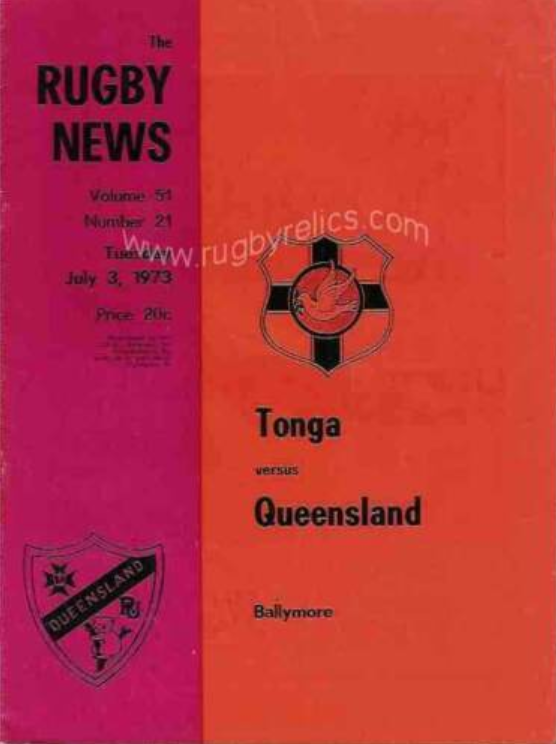
Here, Tonga received a wet-weather rugby lesson in their 18-10 defeat to Queensland. The Tongan team was virtually the same as the one which inflicted a 11-16 defeat on Australia but faced with torrential rain, a muddy field and a slippery bull, they were a different side!
Queensland scored three tries to the Tongans’ two, but should have enjoyed an even greater winning margin. Test players Jeff McLean and Geoff Richardson together managed to land only two goals from nine attempts. Much of Tonga’s problems could be traced to the dismissal from the field of captain and No 8 Sione Mafi early in the second half for a head high tackle on McLean. At this stage, Tonga had been trailing only 10-11. Samiuela Latu, the Tongan left winger, scored his side’s two tries, both resulting from some clever lead up work by Mafi. Halfback Ha’ Una Fonua and fullback Vahta Ma-Ake, two key players
in Tonya’s historic Test win performed well under the relentless Queensland pressure again.
Aftermath
Fatai Kefu, the father of current Tonga coach and Wallabies legend Toutai Kefu, played in the match. Fatai took up residency in Brisbane and two of his sons, Toutai and Steve, went on to play for Australia. Toutai played for Australia 60 times and won a Rugby Union World Cup medal in 1999 and Steve has 6 caps. Toutai Kefu has been coaching the Tonga national team since 2016.
Many of the players have sadly died. Fatai Kefu passed away in 2013. Another Tongan legend, Fa’aleo Tupi also played in that legendary team. He would go on to play a pivotal role in bringing Polynesians to play rugby union in Australia. Three years after that match at Ballymore, Tupi moved to Australia on a working visa alongside Fatai Kefu. Both players were lured to the Souths Magpies in Brisbane, a team that was struggling at the time. Tupi sadly died in August 2022.
To commemorate the occasion Tonga will play against Australia A in July at the Teufaiva Stadium exemplifiing Australia and Tonga close relationship on and off the sporting field.
Since that famous day there have been further famous victories for Ikale Tahi. They have since beaten France (1999 and 2011), Italy (1999 and 2016) and Scotland (2012) in Aberdeen of all places!
